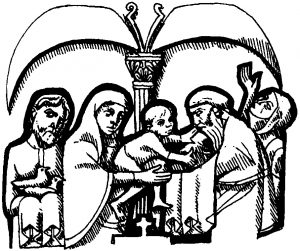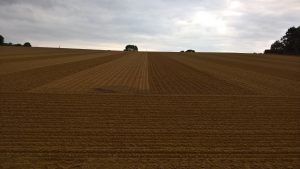Hebrews 2:1-14, Luke 2:22-40
In the name of the Father, the Son and The Holy Spirit, Amen.
The phrase Let go and let God – is one that I can often be heard saying to myself. Particularly when life takes an unusual and unexpected turn. This phrase has been a pretty constant companion in the ups and downs of my life here! I use this phrase – Let go and let God – To take a step back, and look into whatever experience it may be that is happening and see where God is working within it and to pause to pray. The idea being to let the Holy Spirit into my heart to influence me and to move me forward:-
-
Letting the Spirit work as the wind blowing us to our next step.
-
Letting the Spirit work as water that cleanses and purifies us, and fills us with new life.
-
Or letting the Spirit work as the light which guides us every step of the way.
Living firmly in the influence of the Spirit is how Simeon lived his life. Simeon who we heard about in our gospel reading this morning. Simeon is introduced to us as an old man of great faith, and one to whom the Spirit has revealed that he would see the Christ, the Messiah in his lifetime. Simeon lived with an attitude of expectant waiting. Our passage said the Holy Spirit rested on him.
Tune in for a moment to Simeon. OK, he had a revelation of the future, that he was going to see the Messiah, but we don’t know what he made of that? We also don’t know if it made sense to him or what he expected to see. I have always doubted he thought it would a babe in arms he would see. Much more likely to have expected a powerful mighty king to overthrow the Romans from other expectations of the day concerning the Messiah.
To his absolute credit Simeon doesn’t waver in his walk with the Spirit. He goes to the temple on that particular day because the Spirit urged him. We don’t know what else he had planned or how inconvenient it was for him to do that. And on seeing the baby he does not hesitate in his recognition of Jesus as the Messiah. (Surprising as it must have been) – as he took the babe in his arms
 He said some of the most profound words in all the New Testament. Words we hold very dear – words which we use regularly in our worship to this very day and in the Book of Common Prayer rendering
He said some of the most profound words in all the New Testament. Words we hold very dear – words which we use regularly in our worship to this very day and in the Book of Common Prayer rendering
Lord, now lettest thou thy servant depart in peace according to thy word. For mine eyes have seen thy salvation, Which thou hast prepared before the face of all people; A light to lighten the Gentiles, and the glory of thy people Israel.
Words that in their power and simplicity move us, but were really radical in his day – as they included us and everyone in Jesus mission on earth – not just the people of Israel. These words are literally his outpouring of what the Spirit had revealed to Simeon. Both before this day and on this day. They are addressed to God and attest to all that Simeon has witnessed. Simeon has also now fulfilled his God given mission and can rest in peace.
Simeon took the unexpected, does not appear to blink an eye and ran with it. He ran with it openly, honestly and obediently to wherever the Spirit led him. Irrespective of the elders and other priests – and those gathered round. Those around may well have thought Simeon was losing the plot rather than welcoming the Messiah. Simeon was probably very grateful to Anna for taking up the mantle in her praise we hear later in this account.
We don’t get any insights into how anyone witnessing this scene reacted beyond Anna, Mary and Joseph. Anna reinforced what Simeon had said. And Mary and Joseph are described as amazed! This astonishment is likely to be a marker of the presence of God in all this.
Simeon goes on to speak to Mary adding to the things in Luke’s gospel that Mary had to ponder on in her heart as Jesus was growing up and in his life as it unfolded. So after blessing them, mother, father and child what Simeon then said to Mary was about Jesus’ bigger and God given destiny.
‘This child is destined for the falling and the rising of many in Israel, and to be a sign that will be opposed so that the inner thoughts of many will be revealed—and a sword will pierce your own soul too.’
There are schools of thought that in the devout Simeon these are words that are based on prophecy in Isaiah 8
14 He will become a sanctuary, a stone one strikes against; for both houses of Israel he will become a rock one stumbles over—a trap and a snare for the inhabitants of Jerusalem. 15 And many among them shall stumble; they shall fall and be broken; they shall be snared and taken.
Of a better known verse from Psalm 118 – the stone that the builders rejected will become the chief Cornerstone. These are also words Jesus himself said later on in Luke’s gospel and are built on by St Paul in Romans and St Peter in his first letter. Jesus arrival will bring salvation and also division to those who turn away from him.
We need follow this example of Simeon and walk confidently with Holy Spirit walking with us when the unexpected as well as the expected comes in our lives. Because we cannot tell what life has in store for anyone of us. However we can recognise and celebrate God’s presence with us in all of it. The power of the Holy Spirit, that Jesus left for us, to move in our lives and rest on us and the hope we have in the salvation Jesus won for us.
Our faith in God is a journey, in Simeon we have an example of someone nearing the end of their journey, open and willing to move with the Spirit – no matter how that made him look and how unexpected it all was. For us on our journeys, let us be just as open and willing to move with the Holy Spirit in our lives as Simeon was.
 I have chosen the name Simeon for our prayer lion. Our prayer lion will feature in days ahead and the new works with a family focus (to help us grow younger and activities we are currently praying for). Simeon is a prayer lion – and will be helping us with our prayers in family friendly services moving forward.
I have chosen the name Simeon for our prayer lion. Our prayer lion will feature in days ahead and the new works with a family focus (to help us grow younger and activities we are currently praying for). Simeon is a prayer lion – and will be helping us with our prayers in family friendly services moving forward.
The name Simeon means he hears or more distinctly from its’ Hebrew routes – he who heard God. When we pray, we are listening for God speaking to us and prompting us. This may happen in our prayers or in our encounters or activities subsequently, or in our walk through the scriptures and prayers day by day. It is important to stay connected and listening for God’s promptings and urgings as Simeon did all those years ago. To pause and Let go and let God!
Simeon the prayer lion’s favourite bible verse is from Joshua – Be bold and courageous, for the Lord your God is with you. Just as Simeon the old man in the temple was bold and courageous in following how the Spirit guided him. Where the wind of the Spirit blows us, where the water of Spirit flows through us and where the light of the Spirit shines in us – let that be guide to our path in the twists and turns of life and particularly as it so has when the unexpected comes.
Let’s let go and Let God into our hearts!
Amen
© The Crown/Cambridge University Press: The Book of Common Prayer (1662)
The New Revised Standard Version (Anglicized Edition), copyright 1989, 1995



